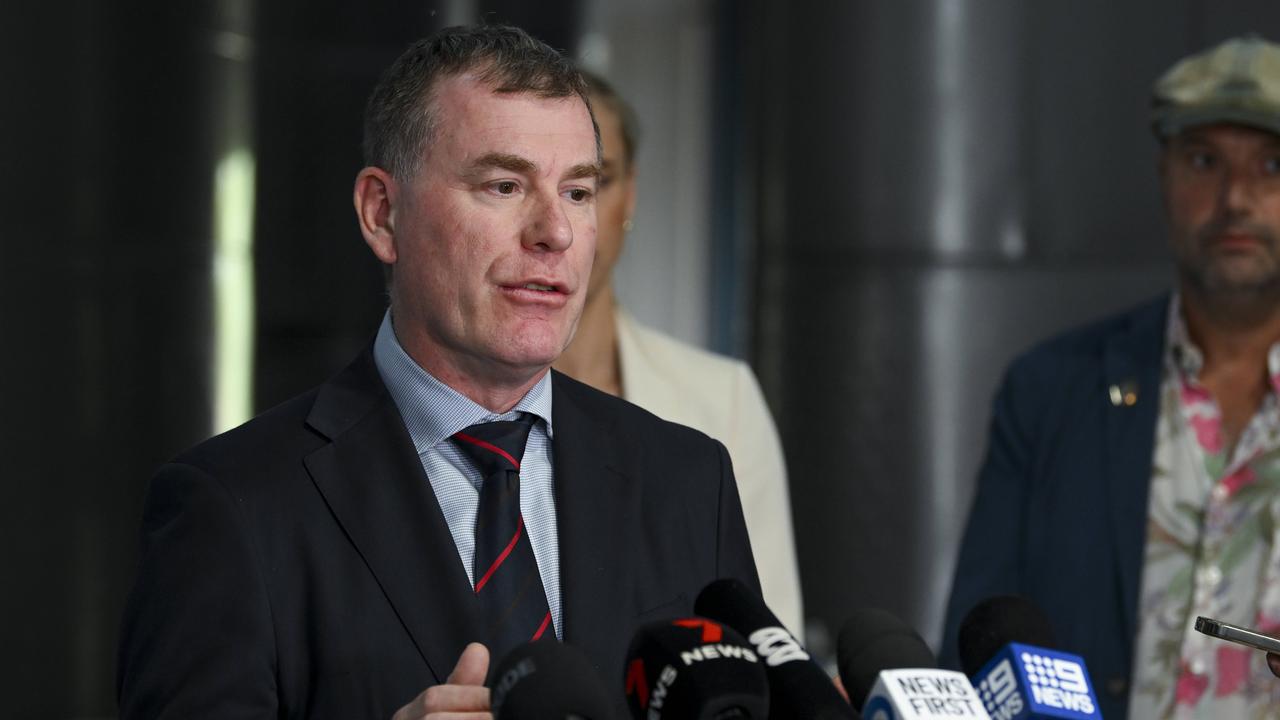Anthony Albanese was accused of threatening to call a double dissolution election, but he has no trigger to do so | Maiden
With the Prime Minister accused of threatening to call a double dissolution election, there’s one problem, he doesn’t have a trigger, writes Samantha Maiden.

Opinion
Don't miss out on the headlines from Opinion. Followed categories will be added to My News.
Anthony Albanese was accused of threatening to call a double dissolution election this week, a hairy-chested, Tarzan act allegedly designed to pile on the pressure over stalled housing reforms.
But there’s a serious problem with anyone taking this threat seriously. The problem is he doesn’t have a trigger.
And anyone seriously suggesting he has a trigger right now doesn’t know how parliament works.

First, let’s get back to basics. Every now and again when politicians and journalists get into a froth about an early election they say the magic words: double dissolution.
It’s exciting, it’s bold, it sounds like a political earthquake.
Lord knows the Albanese Government isn’t always the most exciting dance troupe in town. Finally, you might think, a blast of rainbow glitter backstage.
Sadly, no.
A double dissolution only happens when there is a deadlock between the Senate and the House of Representatives on a proposed law.
A double dissolution is when the governor-general – on the advice of the prime minister – dissolves both Houses of Parliament to call an election.
It occurs when a bill passes the House of Representatives but fails to pass the Senate twice.
Three months must then elapse between the two attempts in the Senate. In theory, a prime minister can then advise the GG that a double dissolution should take place.
It means every single seat in the House of Representatives and the Senate is up for re-election, not just half of the Senate as is generally the case.
But here’s the kicker. A double dissolution can only take place six months or more before the expiry date for the House of Representatives.

Section 57 of the Australian Constitution details the triggers, the conditions for a double dissolution:
1. The House of Representatives passes a bill and sends it to the Senate.
2. The Senate rejects or fails to pass the bill, or passes it with amendments – changes – that the House will not agree to.
3. Three months pass from when the Senate disagrees with the bill. The House passes the same bill and sends it to the Senate again.
4. The Senate again rejects or fails to pass the bill, or passes the same bill with amendments to which the House will not agree.
5. Once these conditions have been met, the Prime Minister can recommend to the Governor-General that a double dissolution of the parliament take place. A federal election will then be held to elect all members of parliament.
6. But such dissolution shall not take place within six months before the date of the expiry of the House of Representatives by effluxion of time.
Now let’s apply those rules to the current state of play.
The House of Representatives is deemed to expire three years after its first sitting, which will be July 25, 2025.
So, the Prime Minister cannot call a double dissolution election, even if he wanted to, until after January 25, 2025.
It is true that there are two potential triggers.
There’s the housing bill which the Prime Minister has been in a froth about because the Greens keep putting it on the back burner.
However, the Albanese Government would have to wait three months to reintroduce it again.
That is, it can’t be reintroduced before December 18 and then it would have to be rejected again prior to January 25.
There’s no chance that is going to happen given parliament isn’t sitting in December and doesn’t sit in January.
Arguably, the Albanese Government does have another option.
Labor’s build-to-rent bill legislation was knocked back in the Senate by the Coalition and Greens. It’s not correct to say it was blocked but it did not pass.
If that “failure to pass” is upheld, and it’s reintroduced in October or November, and rejected again this year, then, the PM could use it for a trigger.
The problem with all of this is he would need to get his skates on.
December 14 is the absolute last date for an election this year. And the last date for calling that would be November 11.
Given the Senate only sits for a week before November that means the Prime Minister would need to bring the bill back and get it defeated in that October sitting week.
Of course, he could get it knocked back before Christmas, then call a double dissolution around Australia Day for late February or March. But unlikely.
The Prime Minister also needs to dodge various state elections – the Queensland election on October 26, and WA election on March 8.
The more likely option is thus December 7, or waiting until after WA goes to the polls and going for April or May.
In a press conference held on Tuesday, Mr Albanese twice refused to rule out the possibility of dissolving the House of Representatives and the Senate over the stall.
But digging into exactly what he was asked is important
‘You could go to a DD though. You probably won’t go to a DD because it wouldn’t be a great result for you, would it?,’’ he was asked.
“Well, we’ll wait and see,’’ he said. “I’ll tell you a way to avoid a DD. It’s for the Coalition and the Greens to vote for legislation that they support.”
Does that constitute a threat? Or was it more of a reflection on the suggestion a double dissolution wouldn’t be a great result?
You be the judge. But a double dissolution election remains highly unlikely.






